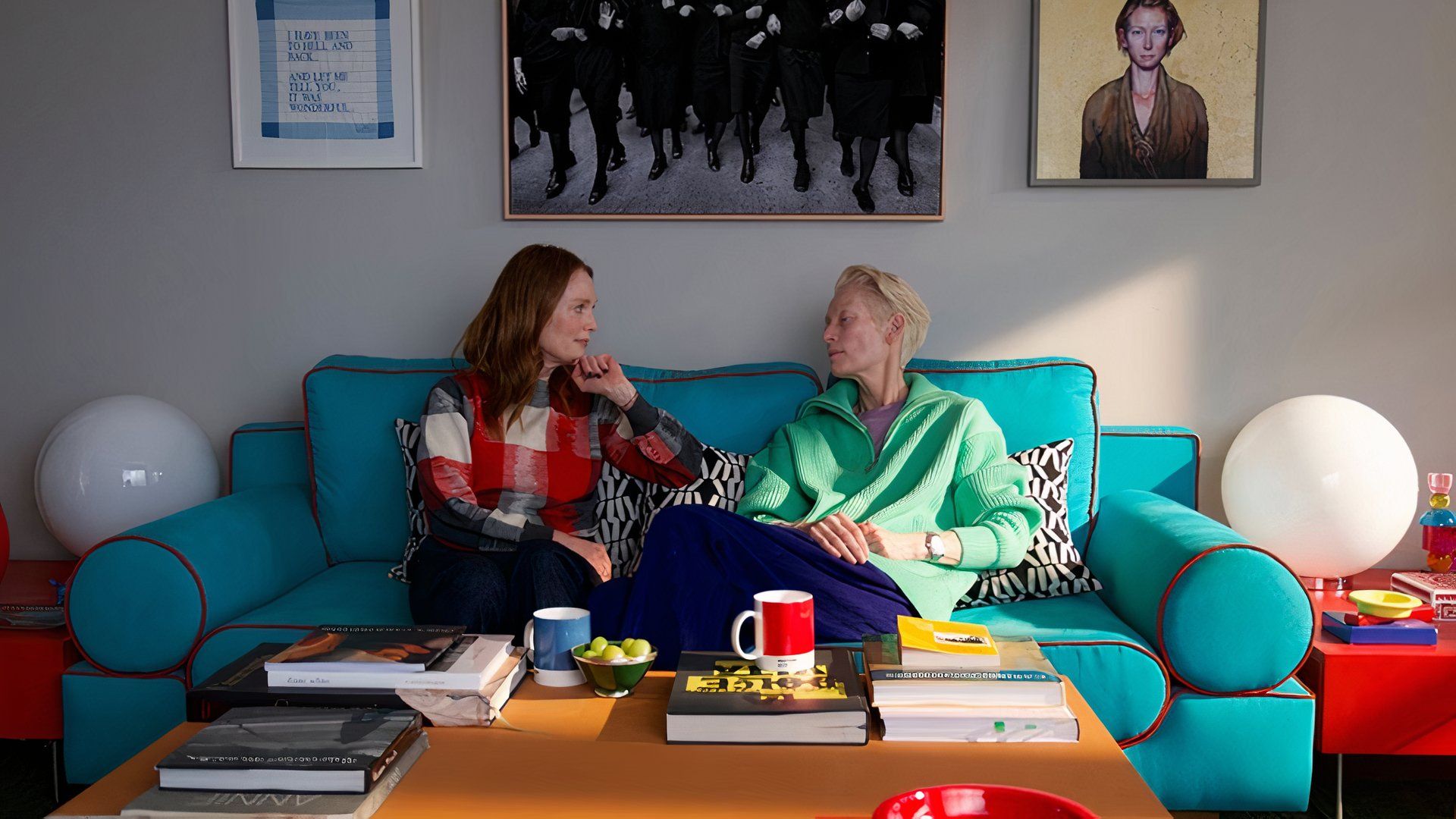The Room Next Door is a sharp, solemn, and darkly funny English-language feature-length debut by filmmaker Pedro Almodóvar. As it stands, his last two titles — the short films The Human Voice (2020) and Strange Way of Life (2023) — were also shot in English. And if they were teasers to a new level for Almodóvar, then The Room Next Door is a veritable confirmation of many more exciting things to come from the Spanish writer and director, who is now in his 50th year behind the camera. His film, which just made its North American premiere at the Toronto International Film Festival, contemplates death, perhaps even embraces it, but in doing so, Almodóvar effectively underscores the need to embrace life and joy.
Based on the novel What Are You Going Through by Sigrid Nunez, The Room Next Doorstars Julianne Moore as best-selling author Ingrid, who finds herself in New York City to celebrate the launch of her new book, which is about her fear of death. As fate would have it, Ingrid learns that her dearest friend Martha (played by Tilda Swinton), a former war reporter, is terminally ill with cancer and is undergoing experimental treatments. It has been years since the two women have connected, but they rekindle their relationship as if no time has passed.
Unfortunately, Martha’s chemotherapy fails, and her cancer metastasizes, giving her only a few months left to live. Determined to choose her own way out, she decides upon self-inflicted euthanasia, requesting that Ingrid be “in the room next door” when it happens. What follows is a push-and-pull between the two women as they contemplate life’s biggest questions, regrets, accomplishments, and, of course, secrets.
Everything You Want in a Pedro Almodóvar Film
Fans of Almodóvar’s Spanish films can rest assured that the director’s visual trademarks carry over in The Room Next Door. The movie is a spectacle of bold colors, from deep reds to vibrant greens, thanks to production designer Inbal Weinberg and cinematographer Eduard Grau’s keen eyes. Weinberg makes each of Ingrid and Martha’s homes feel warm and inviting, and each of Grau’s shots feels like live-action painting, each welcoming us into the two women’s world — and, for that matter, their friendship — as if we, too, are reuniting with old friends. It’s a remarkable contrast to the conversations surrounding mortality that Ingrid and Martha constantly engage in, effectively enhancing the inherent tension between life and death.
Of course, a movie about death, and a Pedro Almodóvar film in general, wouldn’t be complete without a little melodrama, and, here, the director does lean into it, but also offers more malleability to the melodrama. The Room Next Door is filled with Martha making sweeping realizations about life, the choices we make, and the consequences we face, heightening, as a result, the emotional stakes of her choice to euthanize herself. At the same time, Almodóvar doesn’t shy away from quiet moments of contemplation, even hesitation, particularly when it comes to Ingrid, who struggles with being a supportive friend. In all, the script is a symphony, but the grace notes don’t go unnoticed.
Incredible Chemistry Between Julianne Moore and Tilda Swinton
Naturally, it’s Moore and Swinton who elevate The Room Next Door to its full height. There aren’t many male directors who write women as well as Almodóvar does, and both actors evidently revel in the complexities of their characters. Moore imbues Ingrid with a tenderness and fragility as she confronts her greatest fear, deftly navigating the intersection between loyalty to one’s friend and one’s natural inclination for self-preservation. She sticks by Martha’s side, never pitying her or blaming her for her unease.
Likewise, Swinton is ethereal, turning in an undeniably magnetic performance as Martha. She embodies strength and steadfastness even in the face of death and deterioration, and, more impressively, she finds moments of light in Martha’s dark situation, wringing out some humor and relief so that the film never treads fully into the morose.
Each of Moore and Swinton’s characters represent opposing ideals in The Room Next Door. As they are often alone together in scenes, watching these two clash, in ideology and philosophy, is like watching a live tennis match between champions — each brings out the best in the other. However, it’s when they harmonize that the film truly sings.
For more information on The Room Next Door and TIFF 2024, visit the festival website for details.
